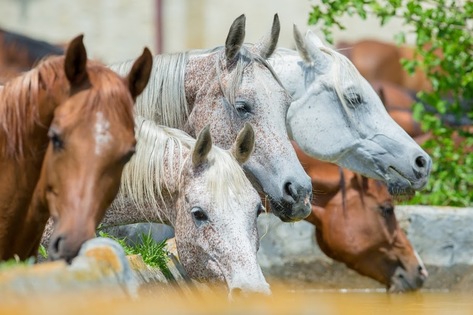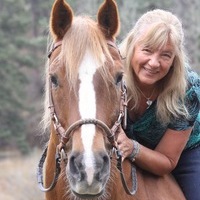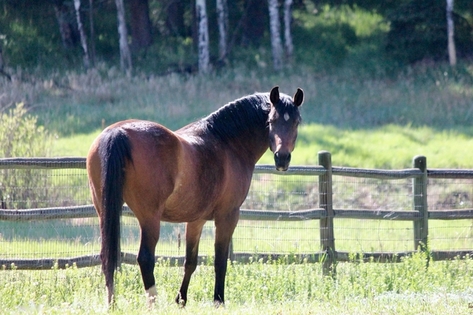
The Most Popular Horse Breeds Of 2019
Equestrian Advice & Guides General Equestrian
Build your business profile for FREE and expose your services to thousands of potential clients!
Create my profile now!
I can’t remember the last time I’ve had only two horses. I was there when she was born and I was there to say goodbye, and I’ll tell you the birthing is a whole lot happier than the deathing.
Her birth was uneventful. Fun. Happy. On a calm spring night in Colorado, she came into the world enveloped in love from her dam and the people gathered around to witness and help her arrival.
It’s odd, really, the fact that I had her for the almost-twelve years of her life. Originally, I had bred her to sell. Her sire-to-be was one of the top Arabian stallions in the world and her dam was one I leased (for a small fortune) in order to produce a high quality foal. The original leased mare wouldn’t take. For months, we tried, shipping semen from California to New York, with me in Colorado. But, no, that mare was not getting pregnant and that was that. The mare owner had others and we switched from the original mare to another, but then I decided that the new mare would cross better with the original stallion’s sire. So in the end, I had a foal coming from a different sire and dam than I’d originally planned, but one that would still surely reap a nice profit, so it was okay., and I anxiously awaited the arrival of what I hoped would be a bay filly eleven months later.
And wouldn’t you know it, the year she was born, the Arabian horse market crashed and breeders cut back on their own stock as well as new buyers being spooked about spending their money on horses. Aside from that, although pretty perfect in conformation, Gazahna was born with a head and neck that didn’t cut the now-expected exotic, eerie snake look that has become industry standard. Now, her head was nice, just not dished enough, she had no club feet, her legs were correct, she was balanced. But, her ears were too big, her muzzle too thick, her eyes just normal sized instead of froggy huge and bulging and those things made her substandard in comparison to what people now wanted in the Arabian horse.
Still, I was offered a nice sum for her from an Arabian halter judge, but turned it down, convinced I’d get more due to her bloodlines and what I was certain would be a stellar show record. Suffice to say I was wrong and home she came after being in training, and showing in the Nationals at Scottsdale in one class where she was second from the smallest and second from the youngest. We were out of our element, she and I.
By the time she was ten months old, I had a healthy sum invested in her, but we all know how you can’t sell at that age unless...well, let’s just say I couldn’t even think of selling her then without losing my butt financially. I decided to wait, start her under saddle myself and then show her and sell once the market bounced back. Yeah. Right.
At five-eleven, I’m not fat, but I felt too big for her. By age three, Gazahna had only reached 15 hands in height and when I began training her as a riding horse, I felt I was too large to ride her, even though I’ve ridden plenty of horses that same size. She had plenty of substance and good bone. Her conformation was good, but still, she was such a baby to me! So, up until she was almost four, we did ground work, I ponied her on trails and around my neighborhood and hiked with her in tow with our four dogs. She always showed herself to be calm, opinionated, not flighty or spooky and willing to do anything asked of her, and we became friends on a level I’ve not had with any other horse I’ve ever owned.
Mares. Arabian mares in particular, bond with their human on a level that few know, and this was true for her and me, but I needed to get her under saddle. Finally, I hired an assistant who was smaller, got her going in the arena and on trails and I didn’t ride her myself until her sixth or seventh year. In a way, I regret that decision now, but I didn’t know how little time we’d have.
We made the trip to the veterinary clinic within thirty-five minutes of finding her down and this timeline includes hooking the trailer, loading two horses, (I didn’t want to leave Luke alone) the four stops along the way to check her; all added to the the twenty-five minute drive. My horses load and travel competently, obediently and consistently, but even with the expediency of getting her to the hospital, even with drugs on board to help ease the pain, we couldn’t help her. She was in agony and getting worse by the minute. Nothing could save her and saying goodbye was the only humane outcome.
The saddest thing for me since Saturday, when I let her go, is opening my front door to silence. No neighing, no calling, nothing; she had a certain call that was for me only. I never heard her call anyone else—not another horse or any human—using that long-short-short-short whinny. When I drive up in my truck, the two boys come to the fence or watch with eager ears, but it’s so quiet. When I feed, no one tries to barge in, open the grain bin and refuse to back out without a mouthful of the other horse’s grain.
The geldings are well-mannered, behaved. They are quiet and they don’t demand anything of me. If I ask either to move over, they do so without a toss of the head, a glare or a stomp of a front hoof. They don’t believe they are special, they are just themselves, here to do anything I want and they agree to do so obligingly and with happy demeanors. They don’t have a smarty-pants dance that they strut just because the sun is out. They don’t care if they are involved in any decision making regarding anything we might do together. They are both very good boys with no agendas and far less input on what they like or don’t like. Nope. They just do whatever is asked of them, and they don’t care who rides them or how balanced that human may sit or if they hold the reins too tight or too loose. They don’t carry themselves in-frame and collected just because they can, and they don’t swish their tails when I reach under them for the blanket straps on the snowy cold nights when I blanket them.
Boys are just easy.
Zahna, on the other hand, was easy if you knew how to ask for what you wanted and knew when to tell her to knock it off and be a good girl. She was good with either approach, if it was fair. She was smart, inquisitive, happy and floaty in her demeanor and gaits, but she could flip and become a little stinker just because you asked her to move to the side so you could pass. She was number three of three and had been fourth in the herd of four, but she liked to pretend that her flattened ears would intimidate any of the geldings or any human. When she was younger, she nipped human arms to prove her point, so her needing to understand the word 'quit', coupled with a low growl was paramount. She had attitude, my little bay mare did, and as the only mare, she was the leader of the herd when let to pasture. She led them all on a spurt of dashing bucks and cartwheels before settling on where to graze first. She was the one who opened all the doors, pushed through any gate that wasn’t latched and begged for treats with the cutest expression a horse could muster.
As I said at the start of this, birthings are easier than the deathings, but in the end, our ability to end the painful agony of colic due to a reason we can never know, is in itself a blessing. I cry for my loss, the emptiness and the vast silence she’s left me with, but I’m grateful for her peaceful passing under the hands of a caring veterinarian while I cradled her head in my lap.
I suppose the question of why or how she came down with such a horrific bout of colic is expected. I’ve asked myself a thousand times why and there is no answer. She didn’t eat anything different, nothing in our weird weather pattern here was any worse than average. The temperature swings are drastic and we accommodate as best we are able. She was warm, dry, fed, mashed and salted as needed. She should be standing out in the corral with the boys. But she’s not.
The oddest thing since Saturday, is the fact that the boys have not called out to her. Luke, my quarter horse gelding was with her, with us, when we let her go. He got to sniff his goodbye and they shared one last call before she got so bad that she couldn’t or wouldn’t call for his help. But Darby, my Mustang, wasn’t with us. He was at a neighbor’s being company for a miniature donkey who’d lost his own horse-friend the Thursday before. Darby did not say goodbye; didn’t know that Gazahna was never coming home.
Yet, neither gelding has called for her. If you have horses, you know how they holler and scream if one is gone from sight or from the premises, even if only for a short time. In the past, and with three or four horses here at all times, when one leaves, the others go a little nuts. This time, though, driving away from the vet hospital with only Luke, on our way to pick up Darby, he said nothing. No calling, nothing, and once both boys were home, the norm is for them to call to the horses waiting. But this time, no one said a word. Silence, all the way up the driveway, into the barn, out to their paddock. No calling for their girl then, and still, today, Tuesday, they are quiet and subdued.
So my question is, how does Darby know Gazahna is gone? Did Luke somehow tell him? And if so, how? Mental images, telepathy, their own language? They should be frantic for her still, and in the past were not prone to just letting it be, letting her be gone. Interesting question, isn’t it?
And because this is a blog post meant to impart some great wisdom from a horse trainer and equine advocate, here it is:
Here’s some of the free stuff I’ve already given out. Please understand that I just don’t have it in me to do anything new. Until next time…
Go out, hug your horses, tell them you love them always and Happily Ever After.
~Tanya Buck
Four gifts for you here: https://conta.cc/37b9oaT

